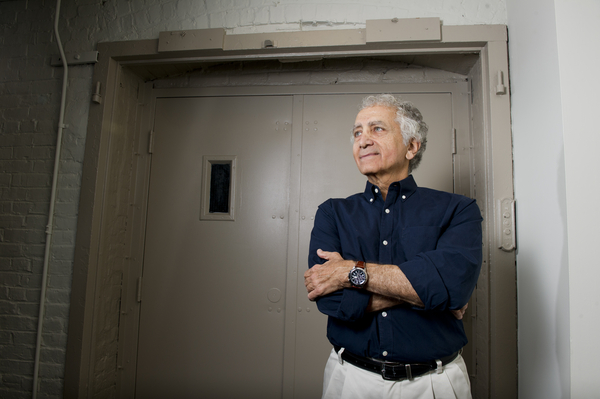The science of fiction

Gary Goshgarian, the English professor and bestselling author of eight critically acclaimed thrillers, did not expect to receive a lifetime achievement award from his alma mater, a research university devoted to the technical arts and applied sciences.
Yes, Goshgarian graduated from the Worcester Polytechnic Institute with a Bachelor of Science in physics in 1964, but he then spent the better part of the next five decades writing award-winning novels, editing college writing textbooks, and teaching courses in science fiction, horror fiction, and modern bestsellers at Northeastern University.
And yet there he was in May, during his 50th college reunion, receiving the Robert H. Goddard Award for Outstanding Professional Achievement. The award, named in honor of the eponymous father of modern rocketry, had in the past been reserved not for English professors, but for astronauts and engineers, patent-winners and CEOs.
“Winning the award was a surprise and quite an honor,” Goshgarian says. “I’m probably the only person who has graduated from WPI and then spent his entire professional life teaching English.”
Though that may be true, Goshgarian’s science background has played no small part in the development—and success—of his novels, the first of which was published in 1980. In addition to studying physics in college, he honed his scientific knowledge while working as a project physicist at the Raytheon Company, where he spent the summers of his sophomore, junior, and senior years. Over the course of his 34-year writing career, his plots, characters, and settings have been informed by his in-depth interviews with scientists, biologists, and even brain surgeons. “The experiences I had were absolutely essential for me to write the books I do,” says Goshgarian, whose nom de plume is Gary Braver. “I wouldn’t know how to frame my questions to the experts without my technical background.”
The common theme of Goshgarian’s novels, “Be careful what you wish for,” is one of the chief motifs in Mary Shelley’s Frankenstein, one of his all-time favorite books. Published in 1818, the classic story of the eccentric scientist and the hideous monster served as the impetus for Goshgarian’s narrative structure, which follows ordinary protagonists who find themselves in extraordinary situations fueled by scientific breakthroughs.
Goshgarian started teaching Frankenstein in 1972, when he founded the nation’s first science fiction course at Northeastern. “The chair of the English department sent out an SOS to the faculty, saying ‘We need some jazzy new courses to attract English majors,’” Goshgarian recalls. “I said, ‘How about science fiction?’”
His suggestion was approved, and it wasn’t long before some 650 students were filling Blackman Auditorium to hear his lectures and take in the musings of guests like Isaac Asimov, the prolific author of I, Robot. “I was young and energetic,” Goshgarian says, “and I had a lot of drive to perfect this sexy, new course.”
Believe it or not, his passion for sci-fi writing and literature started to flourish at WPI, where he wrote for the student paper, founded a humor magazine, and befriended an English professor who later became his mentor. “I wanted to grow up to be like this guy,” Goshgarian recalls thinking. “I thought, ‘This writing thing comes to me much easier than under-standing subatomic particles.’”
In short order, Goshgarian “exhausted all the humanities courses” at WPI and then started taking classes in Shakespeare and Victorian literature at Harvard and Clark University. In 1966, he earned his master’s in English from the University of Connecticut; in 1969, he was hired by Northeastern, where he later won an Excellence in Teaching Award; and in 1971 he earned his doctorate in English from the University of Wisconsin.
Over the past 50 years, Goshgarian has compiled more than a few nuggets of wisdom for aspiring writers: One tip: “Read slowly and look at another author’s writing the way a carpenter looks at a house.” Another: “Write every day, even if it’s gibberish. If you want to write, you have to write.”
Goshgarian follows his advice to a T, writing every day at the crack of dawn. His next book, Primitive, in which a tech-savvy Bostonian ditches his iPhone in favor of simple living on a remote Aegean island, will be released later this year.





